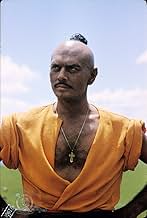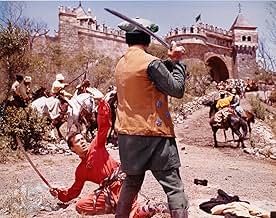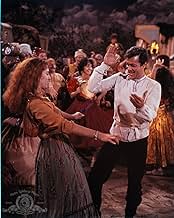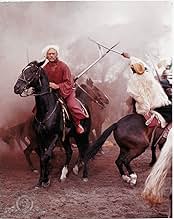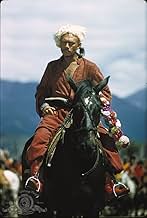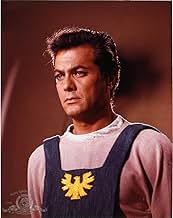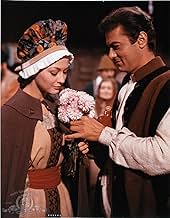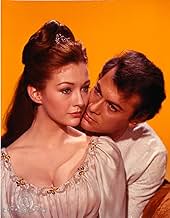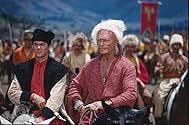IMDb-BEWERTUNG
6,3/10
4800
IHRE BEWERTUNG
Im 16. Jahrhundert kämpfen die polnischen Oberherren und die ukrainischen Kosaken für die Kontrolle des Landes, aber häufige türkische Invasionen zwingen sie, sich gegen den gemeinsamen türk... Alles lesenIm 16. Jahrhundert kämpfen die polnischen Oberherren und die ukrainischen Kosaken für die Kontrolle des Landes, aber häufige türkische Invasionen zwingen sie, sich gegen den gemeinsamen türkischen Feind zu vereinen.Im 16. Jahrhundert kämpfen die polnischen Oberherren und die ukrainischen Kosaken für die Kontrolle des Landes, aber häufige türkische Invasionen zwingen sie, sich gegen den gemeinsamen türkischen Feind zu vereinen.
- Regie
- Drehbuch
- Hauptbesetzung
- Für 1 Oscar nominiert
- 3 Nominierungen insgesamt
Leon Alton
- Servant
- (Nicht genannt)
Empfohlene Bewertungen
Taras Bulba is directed by J. Lee Thompson and adapted to the screen by Waldo Salt and Karl Tunberg from a story by Nikolai Gogol. It stars Yul Brynner, Tony Curtis, Christine Kaufmann and Perry Lopez. Out of United Artists, it's a DeLuxe/Eastman Color/Panavision production, with the music scored by Franz Waxman and cinematography by Joseph MacDonald.
Loosely based on Gogol's short novel, story tells of a Cossack uprising against the Polish forces who have taken control of the Ukraine. At the centre of the Cossack army is the leader Taras (Brynner) and his two sons, Andrei (Curtis) and Ostap (Lopez). But when Andrei falls in love with a Polish princess called Natalia (Kaufmann), it sets the wheels in motion for the Bulba family to crack from within; just as the Polish come calling asking for the Cossacks' help to defeat the Turkish.
While not as epic as the film, the troubled back story of the production is big enough to lend one to understand why Taras Bulba is not the grandiose picture the story deserves. Main problem comes with casting, particularly that of Curtis as the elder Bulba son. It should have been Burt Lancaster, who walked, so in came Curtis and a decision was made to put him front and centre of the picture. Thus rendering Brynner's title character to playing second fiddle, so much so they really should have called the film Andrei Bulba instead. On his day Curtis could act, but he's out of place here playing a Cossack with brain and brawn. Then there was the small matter of Curtis' marriage to Janet Leigh falling apart, with Leigh visiting the set, falling ill and no doubt noticing the sparks flying between Curtis and his delectable co-star, Kaufmann. Curtis would say it wasn't the final straw, but with him going on to marry Kaufman shortly after his divorce, it's hard not to think that it sealed the deal!
He's not helped by the writers, though, who allow the love story sub-plot between Andrei and Natalia to form the core of the plot. They too, Messrs Salt & Tunberg, were brought in after historical novelist Howard Fast (Spartacus) refused to tone down the screenplay. He wanted to include what was an important part of the Cossack/Pole war, that of the Cossacks anti-Semitic attack on Polish Jews. The makers balked and Salt & Tunberg came in and delivered the Andrei overkill and some rather cheese laden dialogue. Brynner was crushed, his biography (written by his son Rock) reveals that it was a role and film he cared for more than any other, he had grand plans for the portrayal but the makers didn't share his view. A shame because what we do get of Brynner is wonderfully exuberant, muscular and (correctly) scene stealing.
However, when Taras Bulba as a film is good, it's real good, and thankfully it's never dull, even if it's a bit more jovial in the mid section than it is meant to be. Thompson was a fine director of action and suspense, and he gets to flex his muscles here to great effect. Casting aside the cheap shots of dummies and wooden horses being hurled about a couple of times, the sight of thousands of men on horseback swarming across the Steppes (actual location used was Argentina) is spectacular. The battles are fierce, violent and gripping, while the scenes in the Cossacks camps are joyous as men drink, sing, test their manhood by doing things like dangling over a bear pit, it's all very robust and Vikingesque, but entertainingly so. There's even some dashing sword play, while quality suspense is eked out during a challenge to the death over a seemingly bottomless gorge.
Joseph MacDonald's Panavision photography neatly brings the wide vistas to life, aided by the use of Eastman Color which gives off a nice period hue. Waxman delivers a blunderbuss score that's seasoned with Russian vitality, while the costume department deserves a mention for their efforts, particularly for the Polish army who look dandy men of steel. Yes it's a film of flaws and bad decisions, but the good does outweigh the bad in this instance, and how nice it is to have the chance to see a little known part of "bloody" history up there on the screen. 7/10
Loosely based on Gogol's short novel, story tells of a Cossack uprising against the Polish forces who have taken control of the Ukraine. At the centre of the Cossack army is the leader Taras (Brynner) and his two sons, Andrei (Curtis) and Ostap (Lopez). But when Andrei falls in love with a Polish princess called Natalia (Kaufmann), it sets the wheels in motion for the Bulba family to crack from within; just as the Polish come calling asking for the Cossacks' help to defeat the Turkish.
While not as epic as the film, the troubled back story of the production is big enough to lend one to understand why Taras Bulba is not the grandiose picture the story deserves. Main problem comes with casting, particularly that of Curtis as the elder Bulba son. It should have been Burt Lancaster, who walked, so in came Curtis and a decision was made to put him front and centre of the picture. Thus rendering Brynner's title character to playing second fiddle, so much so they really should have called the film Andrei Bulba instead. On his day Curtis could act, but he's out of place here playing a Cossack with brain and brawn. Then there was the small matter of Curtis' marriage to Janet Leigh falling apart, with Leigh visiting the set, falling ill and no doubt noticing the sparks flying between Curtis and his delectable co-star, Kaufmann. Curtis would say it wasn't the final straw, but with him going on to marry Kaufman shortly after his divorce, it's hard not to think that it sealed the deal!
He's not helped by the writers, though, who allow the love story sub-plot between Andrei and Natalia to form the core of the plot. They too, Messrs Salt & Tunberg, were brought in after historical novelist Howard Fast (Spartacus) refused to tone down the screenplay. He wanted to include what was an important part of the Cossack/Pole war, that of the Cossacks anti-Semitic attack on Polish Jews. The makers balked and Salt & Tunberg came in and delivered the Andrei overkill and some rather cheese laden dialogue. Brynner was crushed, his biography (written by his son Rock) reveals that it was a role and film he cared for more than any other, he had grand plans for the portrayal but the makers didn't share his view. A shame because what we do get of Brynner is wonderfully exuberant, muscular and (correctly) scene stealing.
However, when Taras Bulba as a film is good, it's real good, and thankfully it's never dull, even if it's a bit more jovial in the mid section than it is meant to be. Thompson was a fine director of action and suspense, and he gets to flex his muscles here to great effect. Casting aside the cheap shots of dummies and wooden horses being hurled about a couple of times, the sight of thousands of men on horseback swarming across the Steppes (actual location used was Argentina) is spectacular. The battles are fierce, violent and gripping, while the scenes in the Cossacks camps are joyous as men drink, sing, test their manhood by doing things like dangling over a bear pit, it's all very robust and Vikingesque, but entertainingly so. There's even some dashing sword play, while quality suspense is eked out during a challenge to the death over a seemingly bottomless gorge.
Joseph MacDonald's Panavision photography neatly brings the wide vistas to life, aided by the use of Eastman Color which gives off a nice period hue. Waxman delivers a blunderbuss score that's seasoned with Russian vitality, while the costume department deserves a mention for their efforts, particularly for the Polish army who look dandy men of steel. Yes it's a film of flaws and bad decisions, but the good does outweigh the bad in this instance, and how nice it is to have the chance to see a little known part of "bloody" history up there on the screen. 7/10
From Harold Hecht production comes the magnificent presentation of Nicholas Gogol's undying story of the mighty chief charging against the Poles into strange lands of the steps . Taras Bulba with his tribes wager war through the long corridors of courage . At this time Polish rule over Ukraine , they join forces with the Cossacks to vanquish the Turks . One time are defeated they force to the Cossacks to live on bad lands . Taras Bulba (Yul Brynner) sends his sons (originally was hired Burt Lancaster but role subsequently was to Tony Curtis and Perry Lopez) to a Polish school . There they encounter hatred , confrontation , struggles but also love when Curtis is enamored with the daughter (Austrian actress Christine Kauffman , she met Tony Curtis on the set and later married him) of a Polish nobleman .
The film gets noisy action , adventures , romance , jarring burst of violence and results to be quite entertaining . Breathtaking battles well staged with thousands of extras displayed by Army of Argentina where was actually shot . Besides , it contains exciting rider races with bounds and leaps over cliffs as well as horses and men falling into the deep . Actors interpretation is more distinguishing , it features of otherwise routine spectacle . Brynner as a straight-talking , savvy chief leading his tribe is superb . He's perfect as a proud , wise and stalwart leader . Brynner plays one of his usual oriental or exotic roles (similarly to Brothers Karamazov , King and I , Salomon , Ten Commandments). Tony Curtis turns a fine performance . Brynner and Curtis together for the first time , like father and like son in this exciting adventure . Tony Curtis plays Yul Brynner's son, but Curtis was only five years younger than Brynner in real life . Perry Lopez and Curtis are also "college students" , when in real life they are about age of 37 . The secondary casting is frankly good such as : Brad Dexter , Sam Wanamaker , Guy Rolfe , Abraham Sofaer and Vladimir Sokoloff's last film , among others . Spectacular and epic musical score by Franz Waxman . Colorful and glamorous cinematography filmed amid the splendor of its original locale by Joe McDonald . The motion picture was brilliantly directed by J. Lee Thompson (Guns of Navarone , Cape fear) , though in his finale career directed Charles Bronson vehicles . The Nikolai Gogol story titled ¨Taras Bulba¨ was formerly filmed in France (1936) , England (1963) and Italy (1963) by Ferdinando Baldi . The movie will appeal to Yul Brynner fans and costumer enthusiasts .
The film gets noisy action , adventures , romance , jarring burst of violence and results to be quite entertaining . Breathtaking battles well staged with thousands of extras displayed by Army of Argentina where was actually shot . Besides , it contains exciting rider races with bounds and leaps over cliffs as well as horses and men falling into the deep . Actors interpretation is more distinguishing , it features of otherwise routine spectacle . Brynner as a straight-talking , savvy chief leading his tribe is superb . He's perfect as a proud , wise and stalwart leader . Brynner plays one of his usual oriental or exotic roles (similarly to Brothers Karamazov , King and I , Salomon , Ten Commandments). Tony Curtis turns a fine performance . Brynner and Curtis together for the first time , like father and like son in this exciting adventure . Tony Curtis plays Yul Brynner's son, but Curtis was only five years younger than Brynner in real life . Perry Lopez and Curtis are also "college students" , when in real life they are about age of 37 . The secondary casting is frankly good such as : Brad Dexter , Sam Wanamaker , Guy Rolfe , Abraham Sofaer and Vladimir Sokoloff's last film , among others . Spectacular and epic musical score by Franz Waxman . Colorful and glamorous cinematography filmed amid the splendor of its original locale by Joe McDonald . The motion picture was brilliantly directed by J. Lee Thompson (Guns of Navarone , Cape fear) , though in his finale career directed Charles Bronson vehicles . The Nikolai Gogol story titled ¨Taras Bulba¨ was formerly filmed in France (1936) , England (1963) and Italy (1963) by Ferdinando Baldi . The movie will appeal to Yul Brynner fans and costumer enthusiasts .
That this classic novel by Gogol about the legendary Ukrainian cossack hero could have been made into a big-budget Hollywood blockbuster, and that this was done at the very height of the cold war seems unbelievable today.
While the film is dated a bit by the kitschy love story involving Tony Curtis' character, Yul Brynner is perfect in his role which seems one of those he was born to play.
A colourful and spectacular historical epic in the best of the then-dying old Hollywood tradition, this is probably the only exposure that the American public at large has to Ukrainian history, and in this alone it is a valuable work. But the film manages to succeed on the entertainment level as well, and I recommend it to all fans of the good ol' Hollywood studio historical drama.
While the film is dated a bit by the kitschy love story involving Tony Curtis' character, Yul Brynner is perfect in his role which seems one of those he was born to play.
A colourful and spectacular historical epic in the best of the then-dying old Hollywood tradition, this is probably the only exposure that the American public at large has to Ukrainian history, and in this alone it is a valuable work. But the film manages to succeed on the entertainment level as well, and I recommend it to all fans of the good ol' Hollywood studio historical drama.
I agree with most of the posts. However, one area that does not get attention is the soundtrack to the movie. When the Cossacks gather and ride to the Polish city to fight, the music is truly great. Having seen the movie over 40 years ago I can still hear the music of the ride to Dubnoi over and over in my head. I find it intoxicating!! Yul Brenner is made for the part of Tarus. I could never see Tony Curtis as a Ukrainian prince and his looks do not fit the part. He is however a Hungarian of Eastern European descent. This is a fun movie that has a great score, cinematography, and some interesting scenes and performances. The Yul Brenner song is laughable though.
I have not seen Taras Bulba for many years and just came online to try and buy a copy. No mention of it at all on Amazon, as if it had never existed. No-one could ever forget the contest as the horses jump the gradually widening ravine, and the defeat in victory for the young Andrei (Tony Curtis) as the old warrior dies. When my wife married me nearly 20 years ago she reminded me of the times I had quoted the polish commander, excuse me if it is not quite accurate but it went something like this. "If we could harness the power of love we could rule the world" So many have tried other ways but still only the power of love will overcome all in the end.
Wusstest du schon
- WissenswertesAccording to director J. Lee Thompson, in an interview in Yul Brynner: The Man Who Was King (1995), there was a misunderstanding with the hundreds of Argentine gauchos playing horsemen . They were told that horsemen who fell off their horse during an attack scene would be paid extra--but only those who were directed to do so. When the scene was shot, two-thirds of them fell off their horses and expected the extra pay. Upon being told they were not going to be paid extra, they threatened to strike. Yul Brynner then took steak dinners out to their encampment that evening and spent hours entertaining them. Impressed by this, the gauchos returned to work the next day.
- PatzerThe Cossack's "scalp-lock" is not on the back but the front! Only the old Cossack is the one that has it correctly.
- Crazy CreditsThanks to the army of the Argentine Republic.
- VerbindungenEdited into Time Tunnel: Attack of the Barbarians (1967)
Top-Auswahl
Melde dich zum Bewerten an und greife auf die Watchlist für personalisierte Empfehlungen zu.
- How long is Taras Bulba?Powered by Alexa
Details
Box Office
- Budget
- 7.000.000 $ (geschätzt)
- Weltweiter Bruttoertrag
- 22.533 $
- Laufzeit2 Stunden 2 Minuten
- Seitenverhältnis
- 2.39 : 1
Zu dieser Seite beitragen
Bearbeitung vorschlagen oder fehlenden Inhalt hinzufügen



